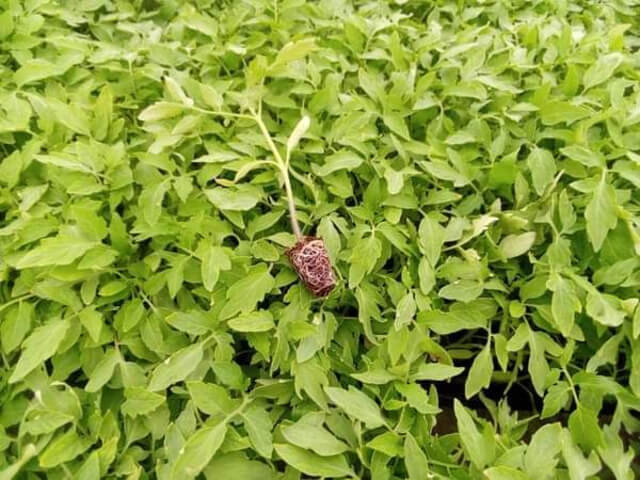An increase in tomato seedling sellers in Kenya is moderating prices by ensuring a consistent supply of tomatoes in markets.
This is avoiding prolonged periods of the fruit’s scarcity and continued high prices, as well as reducing the need for brokers shipping tomatoes in from neighbouring countries.
Previously, the expertise and financing required to propagate vegetable seedlings was a reserve of companies set up by foreign nationals such as Plantech Kenya. However, in time, the techniques and tools required for nursery seedling management have become more widely understood and accessible. This has seen a proliferation of seedling suppliers.
According to Lamech Victorious, a seedling propagator since 2018, the Covid-19 pandemic saw many Kenyans flock into farming. Subsequently, there was a boom of seedling propagators to meet the growing demand for seedlings by newbie farmers.
Related News: Long-term weather forecasts guide farmers to tomato millions
Related News: Crushed eggs antidote to blossom end rot in tomatoes
“No matter the season, if I need 1,000 tomato stems to plant, I could have them delivered and in the ground by the end of the day. This was impossible five years ago when I started growing tomatoes,” explained Joshua Mutuku, a horticulture farmer based in Meru.
These tomato seedlings mature in about two months. This has greatly reduced the wait times for tomatoes to reach markets as growing them from seed takes farmers about 100 days.
“Recently, price spikes have more often been catalysed by extenuating circumstances such as the recent El-Nino-caused floods, not a lack of supply in markets. Since 2021 there have been increasingly fewer imports of tomatoes from Ethiopia and Uganda. Barring one to two-week windows, the supplies of Kenyan tomatoes have become fairly consistent,” informed Sam Kilosh, a trader at Nairobi’s Wakulima Market.
Related News: Farm grows water guzzling tomatoes in arid Eastern Kenya
Expertly propagated seedlings also have an 80-95 per cent germination rate and have well-formed roots meaning they are not easily susceptible to pests and diseases as well as transplanting shock. This means that farmers are now harvesting more tomatoes than they ever have.
Though they cost between four shillings and Sh12 a seedling, farmers prefer purchasing seedlings to avoid these propagation losses. Inexperienced farmers can lose up to 30 per cent of their tomatoes while they are still in the nursery.
